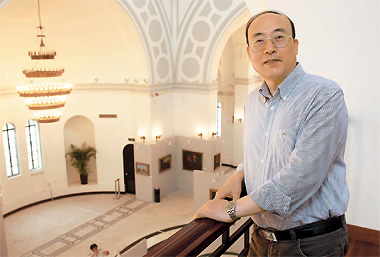 |
|
Shanghai architect-turned-artcollector Sha Aide fell under the influence of Soviet culture in China during his youth, and it continues to play a major role in his life through an almost obsessive devotion to a Russian artist's works.
|
When art collector Sha Aide acquired his first Russian oil painting it haunted him day and night. He would find himself getting up in the middle of the night to stare at it hanging in his living room, and forget to go to work in the morning to have another look.
When he opened an exhibition to display some of the finest paintings in his collection, a similarly wondrous chord was touched amongst young and old Chinese.
Long lines of people formed around the block to gain entry to the free exhibition when it opened in mid-June. Retirees in their 70s traveled from Shanghai's suburbs to the exhibition venue, the Russian Orthodox Church on Xinle Road, and mainstream Chinese media beat a path to Sha's door.
The stark realism of the Russian paintings harked back to another era when the Soviet culture influence in China was all encompassing. Moscow shaped everything from politics, to art to women's fashion -- an influence which a few short decades later has all but disappeared from popular culture.
The reaction is indicative of what Sha calls a "Russian complex" in Chinese people's hearts.
"An elderly visitor left me a message to say he came three times and another that he came from as far away as Qingpu," says Sha.
"Russian culture touches deep emotions. It had a huge and wide influence on generations of Chinese both before and after me.
"Many of the visitors are in the fine arts circles and were young when the influence was strongest. Younger visitors are influenced by their teachers."
Sha, a successful, serial entrepreneur, was also subject to its influence, consciously and subconsciously.
Born in the 1950s, Sha was an architect by training and had a designer's appreciation for art. As a child, he watched lots of Russian films, read Russian literature and saw Russian ballets. "It probably led to the collecting now," he reflects.
But as one of the first generation of trained architects in modern China, he has spent his career riding the wave of massive construction taking place across the country since the 1970s' reforms.
He remembered when in his early 30s construction projects -- from fabric factories to industrial plants -- so outnumbered architects in the country that he had to work late into the night seven days a week to keep up.
By the 1990s a new trend, that of business entrepreneurship, was encouraged to take root by the government.
Sha by then had made a name for himself as a talented architect working at the architecture branch of the Shanghai Textile Bureau, the largest industrial entity in the city at the time. Again, he was caught in the march of history.
In 1993, he was encouraged by his state employer to set up his own private architecture practice. Construction continued and business boomed so in the next four years Sha set up another two companies, all in the architecture, construction and interior design industries.
Even as a CEO of three companies, Sha hates being called "boss" and sees himself as first and foremost, "a technician poring over the drawing board." After decades of working hard to achieve success, he says he is not used to splashing out.
He wears no designer labels, never touches alcohol or plays mahjong, and drives a simple car. All the money he saved goes into collecting art.
He does however have the risk-taking attitude common among entrepreneurs -- but not so common to technicians.
The project that made his name as a young and relatively inexperienced designer in the 1980s was a huge and complex water treatment plant that others had been too afraid to handle because of Shanghai's unstable soil conditions.
"Actually, I would be too afraid to do it today," he laughs.
Completed just when environmental issues were gaining importance, it became a model for other facilities to follow.
"My father always told me in every life a few big opportunities will come along," says Sha of his success. "You won't get many, maybe only one or two in a lifetime, but if you can manage them properly they can completely change your fate."